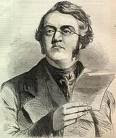
Thackeray, rather impressively, had managed to lose all his money by the age of 25. This was partly because he was a pretty bad businessman, and partly because he had a pretty big gambling problem.
He thus had turned to writing for an income, and eventually in his late thirties managed to produce VANITY FAIR, the novel that gave him back his financial independence, and eventually his claim to literary posterity. I always feel rather a fondness for these historical figures who only get their acts together in their thirties.
VANITY FAIR is, curiously enough, both a wickedly comic and a deeply moral book. It tells the story of two young women: Becky, who is poor, dishonest, and very clever, and Amelia, who is rich, honest and about as dim as a trout. I would summarise the plot, but honestly, this thing is 900 pages long, I don’t think you want me to. Briefly: marriage, Battle of Waterloo, death, debts, Wimbledon, bankruptcy, long lost love, India, happily ever after.
The joy of it really is the shining comic voice. Here, about a hopeful MP:
But though he had a fine flux of words, and delivered his little voice with great pomposity and pleasure to himself, and never advanced any sentiment or opinion which was not perfectly trite and stale, and supported by a Latin quotation; yet he failed somehow, in spite of a mediocrity which ought to have insured any man a success.
A wonderful book.
Trivia!: Weirdly, Thackery went to the same school – Charterhouse – as an author two books back, Robert Graves, and hated it just as badly, always calling it Slaughterhouse.

